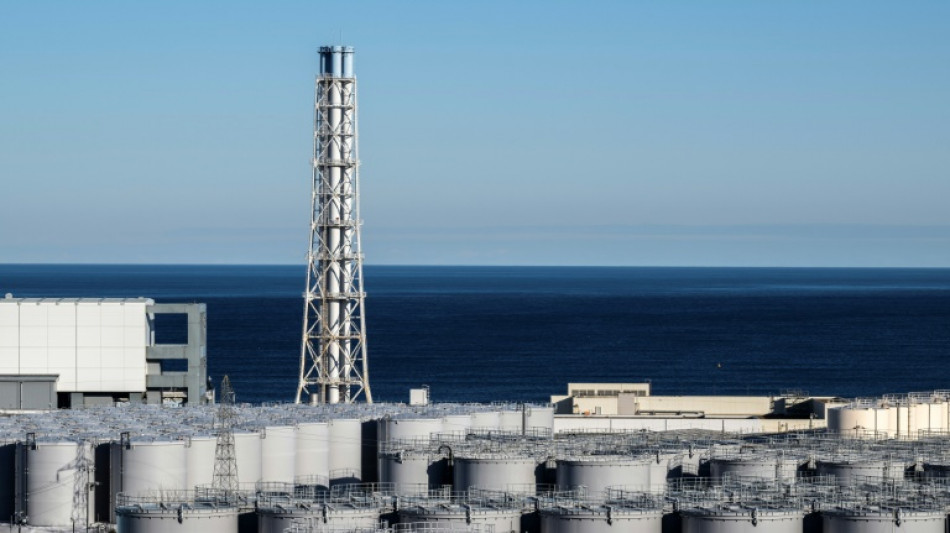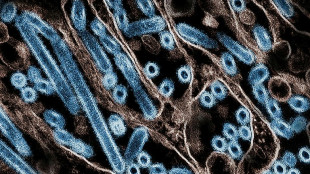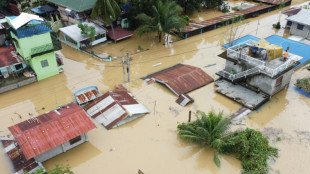
-
 Bird flu mutated inside US patient, raising concern
Bird flu mutated inside US patient, raising concern
-
Slovakia says ready to host Russia-Ukraine peace talks

-
 Maresca challenges Chelsea to react to Fulham blow
Maresca challenges Chelsea to react to Fulham blow
-
Tech slump slays Santa rally, weak yen lifts Japan stocks higher

-
 Test records for Zimbabwe and Williams as Afghanistan toil
Test records for Zimbabwe and Williams as Afghanistan toil
-
LawConnect wins punishing Sydney-Hobart yacht race

-
 Barca's Yamal vows to 'come back better' after ankle injury
Barca's Yamal vows to 'come back better' after ankle injury
-
Olmo closer to Barcelona exit after registration request rejected

-
 Watching the sun rise over a new Damascus
Watching the sun rise over a new Damascus
-
Malaysia man flogged in mosque for crime of gender mixing

-
 Montenegro to extradite crypto entrepreneur Do Kwon to US
Montenegro to extradite crypto entrepreneur Do Kwon to US
-
Brazil views labor violations at BYD site as human 'trafficking'

-
 No extra pressure for Slot as Premier League leaders Liverpool pull clear
No extra pressure for Slot as Premier League leaders Liverpool pull clear
-
Tourists return to post-Olympic Paris for holiday magic

-
 'Football harder than Prime Minister' comment was joke, says Postecoglou
'Football harder than Prime Minister' comment was joke, says Postecoglou
-
Driver who killed 35 in China car ramming sentenced to death

-
 Bosch gives South Africa 90-run lead against Pakistan
Bosch gives South Africa 90-run lead against Pakistan
-
French skier Sarrazin 'conscious' after training crash

-
 NATO to boost military presence in Baltic after cables 'sabotage'
NATO to boost military presence in Baltic after cables 'sabotage'
-
Howe hopes Newcastle have 'moved on' in last two seasons

-
 German president dissolves parliament, sets Feb 23 election date
German president dissolves parliament, sets Feb 23 election date
-
Slot says 'too early' for Liverpool title talk

-
 Mayotte faces environment, biodiversity crisis after cyclone
Mayotte faces environment, biodiversity crisis after cyclone
-
Amorm says 'survival' aim for Man Utd after Wolves loss

-
 Desertions spark panic, and pardons, in Ukraine's army
Desertions spark panic, and pardons, in Ukraine's army
-
China sanctions US firms over Taiwan military support

-
 World number six Rybakina makes winning start at United Cup
World number six Rybakina makes winning start at United Cup
-
Israeli strikes hit Yemen airport as WHO chief prepares to leave

-
 Swiatek not expecting WADA appeal over doping scandal
Swiatek not expecting WADA appeal over doping scandal
-
'Dangerous new era': climate change spurs disaster in 2024

-
 Fritz motivated for Slam success after low-key off-season
Fritz motivated for Slam success after low-key off-season
-
Move over Mercedes: Chinese cars grab Mexican market share

-
 Zverev aiming to challenge Sinner for top ranking
Zverev aiming to challenge Sinner for top ranking
-
N. Korean soldier captured in Russia-Ukraine war: Seoul

-
 Inspired Tsitsipas looking to 'refresh, regroup' in Australia
Inspired Tsitsipas looking to 'refresh, regroup' in Australia
-
Seahawks edge Bears to boost NFL playoff hopes

-
 Thunder NBA win streak at nine as Shai ties career high with 45
Thunder NBA win streak at nine as Shai ties career high with 45
-
India announces state funeral for ex-PM Manmohan Singh

-
 Japan govt approves record budget for ageing population, defence
Japan govt approves record budget for ageing population, defence
-
Japanese shares gain on weaker yen after Christmas break

-
 South Korea's acting president faces impeachment vote
South Korea's acting president faces impeachment vote
-
Fleeing Myanmar, Rohingya refugees recall horror of war

-
 Smith century puts Australia in control of 4th Test against India
Smith century puts Australia in control of 4th Test against India
-
Israeli strikes hit Yemen as Netanyahu fires warning

-
 Peru ex-official denies running Congress prostitution ring
Peru ex-official denies running Congress prostitution ring
-
Australia's Smith reaches 34th Test century

-
 NHL Red Wings fire Lalonde and name McLellan as head coach
NHL Red Wings fire Lalonde and name McLellan as head coach
-
The Bilingual Book Company Launches New, Innovative Bilingual Audiobook App

-
 Injured Halep withdraws from Australian Open
Injured Halep withdraws from Australian Open
-
Liverpool power seven points clear, Man Utd crash at Wolves

| RBGPF | -1.17% | 59.8 | $ | |
| CMSC | -0.34% | 23.58 | $ | |
| GSK | -0.69% | 33.885 | $ | |
| VOD | -0.06% | 8.415 | $ | |
| RIO | -0.7% | 58.84 | $ | |
| SCS | -0.46% | 11.845 | $ | |
| NGG | 0.34% | 59.12 | $ | |
| BTI | -0.43% | 36.275 | $ | |
| RELX | -0.92% | 45.44 | $ | |
| BCC | -2.26% | 120.21 | $ | |
| CMSD | -0.33% | 23.4 | $ | |
| AZN | -0.85% | 65.96 | $ | |
| RYCEF | -0.69% | 7.2 | $ | |
| JRI | -0.83% | 12.1 | $ | |
| BCE | -1.15% | 22.61 | $ | |
| BP | 0.16% | 28.895 | $ |

IAEA chief reassures Fukushima residents over water release
The head of the UN's nuclear watchdog tried to reassure local residents and representatives on Wednesday that the planned release of treated wastewater from the Fukushima nuclear plant is safe.
The planned, decades-long discharge of accumulated water from the devastated nuclear facility has been approved by the International Atomic Energy Agency (IAEA) as meeting global standards.
Its chief Rafael Grossi acknowledged at a meeting in Iwaki, Fukushima prefecture, that concerns remain.
"All these complex graphs and statistics are one thing but the reality, the reality of people, the reality of the economy, the reality of the social mood and perceptions may be different," he told a meeting of residents and officials.
Some 1.33 million cubic metres of groundwater, rainwater and water used for cooling have accumulated at the Fukushima site, which is being decommissioned after several reactors went into meltdown following the 2011 tsunami that badly damaged the plant.
Plant operator TEPCO treats the water through its ALPS processing system to remove almost all radioactive elements except tritium, and plans to dilute it before discharging it into the ocean over several decades.
The release is expected to begin this summer but is opposed by some regional neighbours, with Beijing vocally condemning the plan, as well as some in Fukushima, particularly fishing communities who fear customers will shun their catches.
Grossi said the IAEA was not involved in the process to "give cover... to decorate something that is bad".
"When it comes to this activity here, what is happening is not some exception, some strange plan that has been devised only to be applied here and sold to you," he said.
"This is, as certified by the IAEA, the general practice that is agreed by and observed by many, many places, all over the world."
- 'No choice' -
Still, there is palpable anger among some residents who fear the reputational damage of the release.
Tetsu Nozaki, chairman of the Fukushima Prefectural Federation of Fisheries Co-operative Associations, argued Japan's government was misrepresenting local sentiment, which he said remained strongly opposed to the plan.
"We fishery operators are left with no choice but to react emotionally and harden our attitude," he told Grossi.
"I beg you to realise... that this project of the release of ALPS-processed water is moving ahead in the face of opposition."
Grossi said he had no "magic wand" that could assuage concerns but pointed out the IAEA will set up a permanent office to review the release over decades.
"We are going to stay here with you for decades to come, until the last drop of the water which is accumulated around the reactor has been safely discharged," he said.
The IAEA said Tuesday in a final report that the release would have "negligible" impact on the environment, a finding that South Korea said it respects.
China has been less conciliatory, with its foreign ministry spokesman warning Wednesday that "the report cannot prove the legitimacy of Japan's ocean-dumping plan".
"The IAEA report has not silenced strong calls to oppose ocean dumping coming from within and outside Japan," spokesman Wang Wenbin said.
Grossi is also visiting the Fukushima plant on Wednesday and will make stops in regional neighbours, including South Korea, after his Japan trip.
burs-sah/pbt
T.Resende--PC



